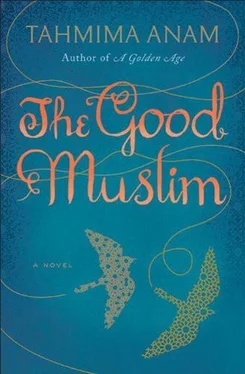He locates the square of cement on to which he is meant to squat, and the tiny tap that protrudes from the side of the building. Most of the boys have returned to their meal, but some watch while he removes his cap and circles one hand over another, prods the insides of his nostrils and ears. He prays.
Finally, he is allowed to eat. The rice is cold and overcooked, but he swallows it in great gulping mouthfuls. As he takes his final bite, a boy throws a spray of rocks at him.
He has missed the dawn lesson. After breakfast he is led into a room with long rows of low, wooden tables. When he sits cross-legged on the mud floor, the table reaches his chest and on it he can place his Qur’an. A man sits at the front of the room with a square desk of his own. His Qur’an is raised by a triangular shelf that holds the book open. In his hand is a length of cane that catches the light and casts snake-like shadows across the room.
He pretends to read, his fingers on the Book, his body moving back and forth, as if at sea and battered by the tide, but now his mind meanders back to his father, the cell, the ferry ride, and as the anger heats up within him he is suddenly very tired, his eyes dragging downwards. To stay awake he concentrates on the wiry shape of the cane, the thought of it striking his legs. He wonders if he can sneak into the Huzoor’s room and retrieve his puffed-rice snacks. He misses Maya. He looks around the room to see if anyone is trying to catch his eye, but no eyes reach out to his; they are all on the same ship, all battered by the same tide.
Later, he tries to sleep, after counting the different noises in the room, the rats, the hum-snoring, the rustle of mosquito nets as they are tucked into sleeping mats. His father has neglected to give him a mosquito net. The Huzoor has instructed the other boys to stretch their nets over his mat, but they have refused. He counts the number of times a mosquito lands near his ear, its buzzing louder than anything he has heard all day. Even the roar let out by the Huzoor when he discovered the boy didn’t know the Arabic alphabet. What comes after alif, ba, ta, sa? What comes after the walking-stick letter? He doesn’t know. The Huzoor strikes him three times across the palm. One, two, three. The mosquito is louder than the strike, beating its wings together, hectic, stereophonic.
He falls asleep in the company of wings.
Joy was leaning against his car. She had heard the horn, gone outside to see who it was and found him smiling, his hands in his pockets.
‘I haven’t seen you in weeks,’ he said.
‘I didn’t call — I’ve been so busy with Ammoo.’ She thought of the last time, with Zaid and the magic trick. Afterwards, the boy had refused to reveal what he had whispered in Joy’s ear. She had hardly left the house since then; in fact, as she looked down at herself now, dressed in a loose cotton salwaar-kameez, she imagined he was already regretting his decision to come. She thought of very little aside from the care of her mother. She ferried her to and from the hospital; she oversaw the chemo therapy treatment; she took an advance from the German tenant to pay the medical bills. And with the little energy she had left, she went back and forth with herself about Zaid. At times she wondered if Sohail might have been right to send him away; after all, he was his father, and the child was not easy. Perhaps he needed the discipline, and it was school, in its own way — school was what the boy had always wanted. At other times she was filled with a cold rage; she lay awake at night and imagined herself screaming at Sohail. Mostly she just ached to see the boy; she would turn as if to tell him something, and then remember it could be weeks, or months, before she might meet him again. She tried to ask Khadija where he was, exactly, but no one upstairs was willing to tell her.
‘Actually, I’ve got an appointment,’ Joy said.
Was he flirting with her? ‘With who?’
‘Not an appointment, really — I heard he was at home in the afternoons. After three o’clock.’
So that’s why he’d come. She resisted the small pinch of disappointment. She remembered that night, in front of Shaheed Minar, when he had cried and taken off his shoes — it seemed such a long time ago. Whatever had seemed possible in that moment had vanished. He was different, the awkwardness gone. The years in America had fallen away, and the Bengali-ness had reasserted itself — she could see it everywhere in him, in the way he held the key of his Toyota in his left hand, swirling the key ring around his finger, and in the slight shadow of stubble he permitted himself.
‘Well, if he’s given you an appointment, you’d better not be late.’
‘Perhaps you could go up and announce my arrival,’ he said. ‘I’m not sure what the protocol is.’ She saw him wanting to ask how changed his friend really was, to ask whether he would be welcome in his jeans and short-sleeved shirt, head uncapped, mind still barricaded against religion.
Maya led the way. At the top of the stairs, seeing Rokeya perched again with her face to the sun, she motioned for Joy to stop. ‘Wait here.’
‘Rokeya. It’s me, Maya.’ Rokeya’s eyes were closed. Maya tapped her on the shoulder. She turned around and opened her eyes, swaying slowly back and forth, intoxicated. Maya crouched down and looked closely at her. Lines of sweat criss-crossed her face, and her lips were damp and loose. Underneath the burkha, she could see the rise of her belly. ‘Rokeya,’ Maya said, ‘go inside. You’ll get heatstroke.’
‘I have to stay here.’ She smiled thinly. ‘It’s all right.’ She turned away again, a flower to the sun.
‘I’ve brought a guest. A man.’
Hurriedly Rokeya pulled the nikab over her head. ‘This way,’ Maya said to Joy, resisting the urge to explain the sight of Rokeya kneeling in the sun, or the rest of the scene, the small piles of rubbish dotted along the ground, the windows papered over, the smell of cooking grease and the sharp odour of urine.
At the entrance to the outer chamber, Maya raised her voice and asked for the Huzoor.
‘Who is it?’ came the reply.
‘His sister, Sheherezade Maya.’ Her full name, so infrequently uttered, added to the strangeness of the occasion.
‘Wait,’ the voice inside said.
‘Tell him his friend Joy is here.’ What’s was Joy’s non-nickname name? Farshad? Farhan? ‘Farhan Bashir.’
They waited in the shadow of the doorway. Minutes passed. For some reason neither spoke. Joy remained fixed in his place, standing with his back to the building and looking out over the road. Then, a shuffle of feet. The curtain parted and a few men left the room, glancing at Maya and quickly averting their eyes. They were soon pooled at the bottom of the stairs, waiting, she assumed, for the signal to return.
A man ushered them inside. The room was smaller than the women’s chamber, but improved by windows on two sides and a fresh coat of whitewash. The floors were covered in a patchwork of mismatched carpets and thick white sheets.
Sohail was waiting for them. He stood as they approached, greeting Joy with a warm pressing of his hands and embracing him three times. ‘As-Salaam Alaikum.’ He sat down heavily in the centre of the room. ‘Bring the lemonade,’ he said to the man who hovered close to his ear.
Sohail did not acknowledge Maya, and she wondered if she should leave, but curiosity kept her rooted to her seat. Joy nodded at something Sohail said. He must, Maya imagined, be resisting the urge to look around, his eye automatically searching for signs of the old Sohail. Not a bookcase or an LP could be seen — this he knew, this he had been told. But surely in the way he said his name, or curled his hand around Joy’s shoulder as he greeted him, there would remain something of the man he had once been, and since shed, snaked off like a worn scrap of hide.
Читать дальше












